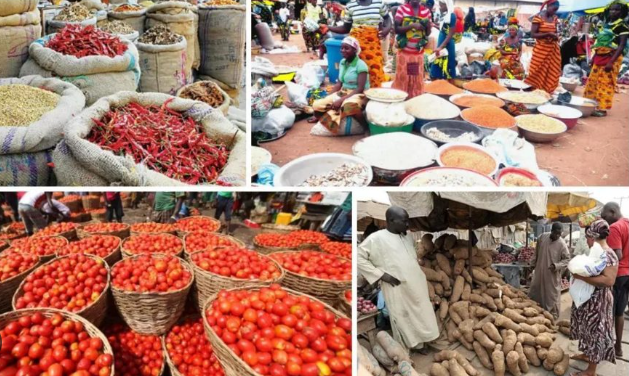By Joke Kujenya
NIGERIA faces an escalating food crisis that threatens both its populace’s well-being and the nation’s stability.
The persistent surge in food prices, now marking its 15th consecutive rise, sends ripples of concern through communities already entrenched in uncertainty.
Recent statistics from the National Bureau of Statistics reveal a stark reality: food inflation has spiked by a staggering 2.09 percent, soaring from 37.92 percent to a jaw dropping 40.01 percent year-on-year.
This alarming increase of 15.56 percentage points compared to the previous year paints a bleak picture of heightened hardship for ordinary Nigerians.
Over a span of 15 months, food inflation rates have steadily climbed, indicating a troubling pattern. From January 2023 to March 2024, there has been a significant 65.33 percent increase in food inflation, highlighting the mounting pressure on consumers and the economy and emphasizing the urgent need for effective mitigation measures.
The crisis is fueled by relentless factors that show no signs of relenting. Insecurity looms large over Nigeria’s agricultural heartlands, impending farmers’ ability to tend their crops and disrupting the distribution of food to those in need.
The failure of the Nigerian government to adequately address this crisis worsens the situations, as political self-interest collides with the scourge of terrorism, further impelling the populace and eroding the foundations of democracy.
In regions where violence disrupts food supply chains, communities endure widespread bloodshed and face illegal land occupation, aggravating hunger and prompting profound questions about the efficacy of governance.
Climate change according the Climate Change Performance Index (CCPI), communities endure widespread bloodshed and face illegal land occupation, impairing Nigeria’s food insecurity dilemma, disrupting fragile ecosystems and causing crop failures due to unpredictable weather patterns.
The country’s mixed performance in addressing climate change accentuates the urgent need for effective policies and a transition to renewable energy sources.
Urbanization compounds the crisis, straining already stretched resource in cities and deterring rural youth from engaging in agriculture due to insecurity.
Amidst the escalating food insecurity, urgent action is imperative to addressing the intertwined issues of insecurity, climate change, and urbanization, the NBS suggests that Nigeria must work tirelessly to ensure food security for all its citizens and build a more resilient and equitable nation.
At JKNewsMedia, our dedication to delivering reliable news and insightful information to our cherished readers remains unwavering. Every day, we strive to provide you with top-notch content that informs and enlightens. By donating to JKNewsMedia, you directly contribute to our mission of delivering quality journalism that empowers and informs. Your support fuels our commitment to bringing you the latest updates and in-depth analysis. Let's continue to uphold the highest standards of journalism and serve our community with integrity and dedication. Thank you for being a part of the JKNewsMedia family and for your ongoing support.





